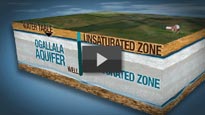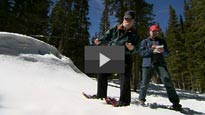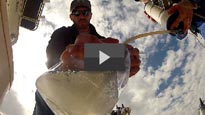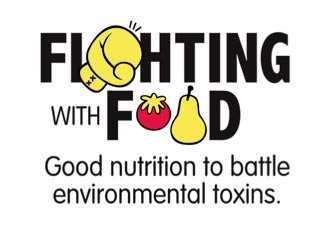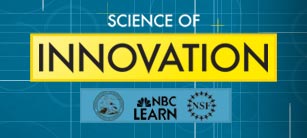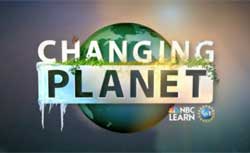
Special Video Report:
Sustainability: Water
Courtesy: NBC Learn and the National Science Foundation
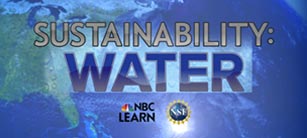
Water makes up most of our bodies, and is essential for any lifeforms' survival. How much do you know about the water cycle or where big cities like Los Angeles get their water?
This seven-week video series, NBC Learn and the National Science Foundation explore water sustainability both as a whole and in specific states across the country. Learn about the environmental and manmade threats and challenges to our most vital natural resource. Viewers will also come to understand the natural water cycle, the new "urban water cycle," and how factors like pollutants affect sustainability.
Select a video by clicking on a topic below
Sustainability: Water - Los Angeles & Water Imports
The nearly 10 million people in the city and county of Los Angeles, California require a lot of water – most of which is imported snow melt from the Eastern Sierra Nevadas and Rocky Mountains, hundreds of miles away. UCLA researchers Stephanie Pincetl and Mark Gold are studying how Los Angeles can reduce its water imports and better capture, store and reuse water for a more sustainable water supply. "Sustainability: Water" is produced in partnership with the National Science Foundation.
Sustainability: Water - Baltimore's Urban Streams
Baltimore, Maryland is a major city situated on the Chesapeake Bay- a sprawling 64,000 square mile watershed. Currently, the Chesapeake is facing an environmental crisis due to pollutants. Scientist Claire Welty of the University of Maryland-Baltimore County is monitoring the travel times of pollutants in the urban streams in and around Baltimore. Through her research, she hopes to gain an understanding of the urban water cycle, and how municipalities can better prevent pollutants from contaminating the greater watershed. "Sustainability: Water" is produced in partnership with the National Science Foundation.
Sustainability: Water - Sierra Nevada Snow Pack & Snow Melt
Snow melt from the snow pack in the Sierra Nevada mountain range provides drinking water to about 30% of California’s residents, irrigates key crops in the San Joaquin valley, and runs hydroelectric power plants that supply at least 15% of the state’s electricity. Scientists Martha Conklin and Tom Harmon of the University of California, Merced are conducting research at the Southern Sierra Critical Zone Observatory, using wireless sensor technology to more accurately measure snow pack and snow melt so that state water managers can make better decisions on how to allocate this precious resource. "Sustainability: Water" is produced in partnership with the National Science Foundation.
Sustainability: Water - The Ogallala Aquifer
Farmers in Kansas and other states that sit atop the Ogallala aquifer – the largest freshwater aquifer in North America – are pumping out water for crop irrigation far faster than natural seepage of rainwater can replenish it. Scientist David Hyndman from Michigan State University is helping develop a plan to better manage this vital resource for sustainable farming. "Sustainability: Water" is produced in partnership with the National Science Foundation.
Sustainability: Water - Dead Trees & Dirty Water in the Rockies
The Rocky Mountains supply water to more than 60 million homes in the West, but this crucial water shed is in peril due to a tiny insect called the mountain pine beetle. Scientists Reed Maxwell of Colorado School of Mines and John Stednick of Colorado State University have teamed up to study the impact of the mountain pine beetle on water quantity and quality in the area. "Sustainability: Water" is produced in partnership with the National Science Foundation.
Sustainability: Water - Nutrient Loading in Lake Erie
Part of the earth's largest surface freshwater system, Lake Erie is a vital source of drinking water for 11 million people. Researchers Anna Michalak, Tom Bridgeman, and Pete Richards are studying how farming practices and severe weather can increase the amount of fertilizer-derived nutrients in the water, which diminishes water quality and threatens the lake's ecosystem and the public's health. "Sustainability: Water" is produced in partnership with the National Science Foundation.
Sustainability: Water - The Water Cycle
This video uses animation, graphics, and video clips to illustrate and explain each of the “flow” and “storage” processes in the Hydrologic Cycle, more commonly known as the Water Cycle: precipitation, interception, runoff, infiltration, percolation, groundwater discharge, evaporation, transpiration, evapotranspiration, and condensation. "Sustainability: Water" is produced in partnership with the National Science Foundation.
Distributed by NIEonline.com with permission
More NIE
Special Reports
►2014 Winter Olympics
►Fighting With Food
►Science of Golf
►Science of Innovation
►Writers Speak to Kids
►Summer Olympics
►Science behind the News
►Science of Hockey
►Black History Month
►Changing Planet
►Cheeseburger Chemistry
►Chemistry Now
►Science of the Olympics
►Science of Football
►CyberBullying
About NBC Learn
NBC Learn is the educational arm of NBC News dedicated to providing resources for students, teachers, and lifelong learners. The online resources NBC Learn has created for the education community leverages nearly 80 years of historic news coverage, documentary materials, and current news broadcasts. Currently two offerings, NBC Learn K12 and NBC Learn Higher Ed, give students and teachers access to thousands of video clips from the NBC News archives, including great historic moments--from the Great Depression to the Space Race to the latest political coverage. NBC Learn also offers primary source materials, lesson plans and classroom planning resources, and additional text and image resources from our content partners. For more information, visit www.nbclearn.com.
About the National Science Foundation
The National Science Foundation (NSF) is an independent federal agency that supports fundamental research and education across all fields of science and engineering. In fiscal year (FY) 2010, its budget is about $6.9 billion. NSF funds reach all 50 states through grants to nearly 2,000 universities and institutions. Each year, NSF receives over 45,000 competitive requests for funding, and makes over 11,500 new funding awards. NSF also awards over $400 million in professional and service contracts yearly.
Additional Resources
NBC Learn | National Science Foundation
NBC Learn K12
Additional resources
Lessons & Classroom Activities
- Cartoons for the Classroom
- Front Page Talking Points
- This Week in History
- News Video
- Science Webcasts
- Headline Geography
Resources by grade level




